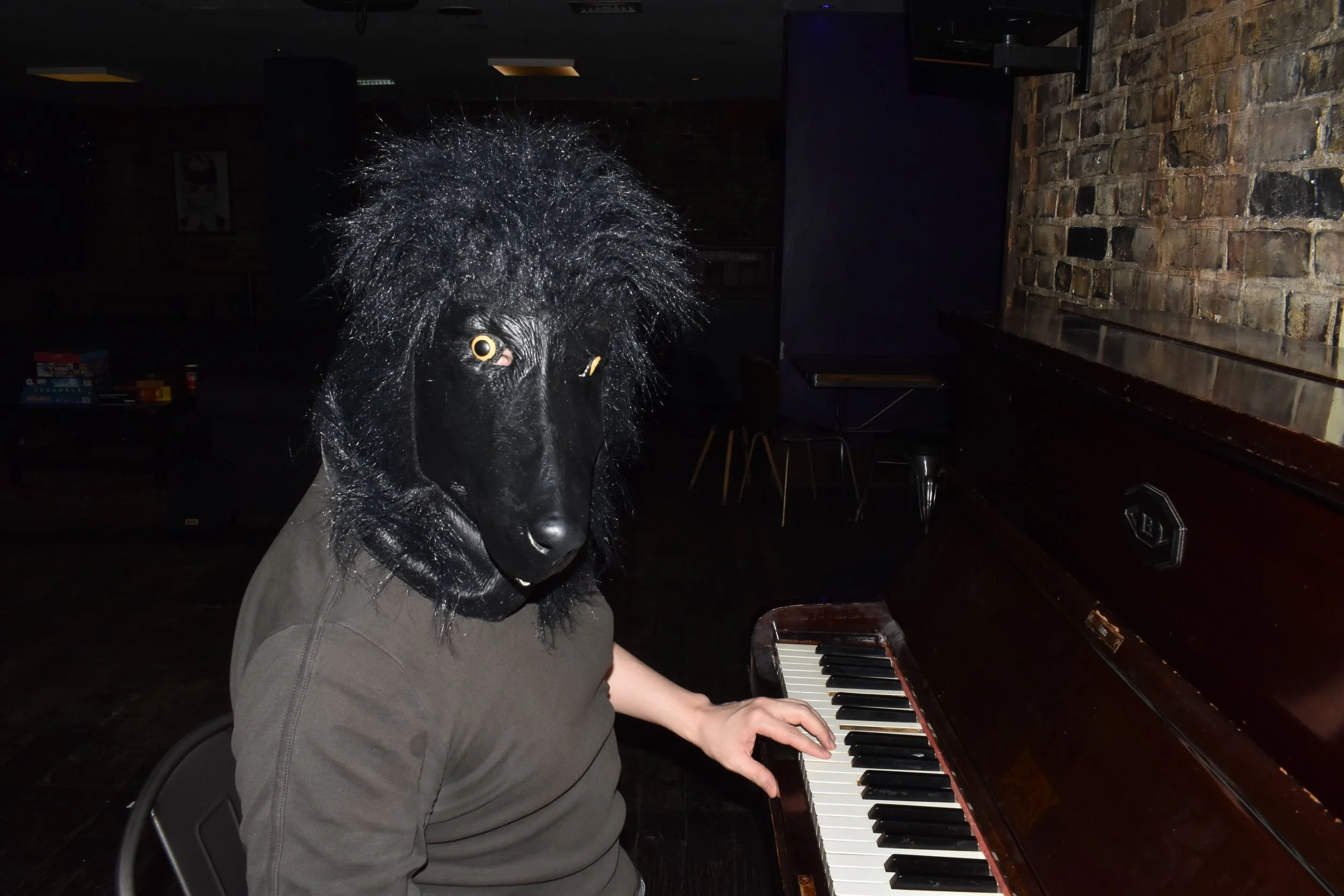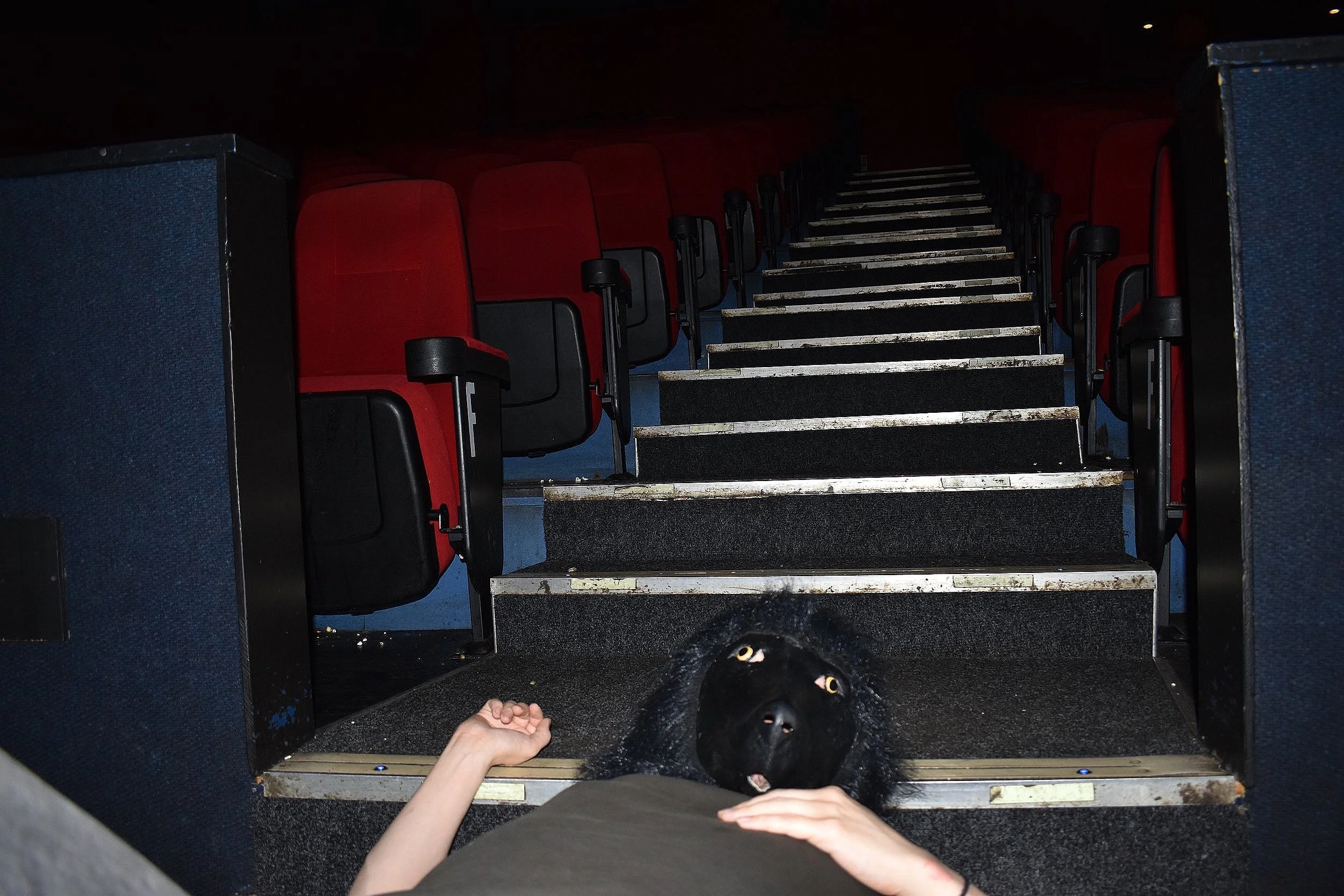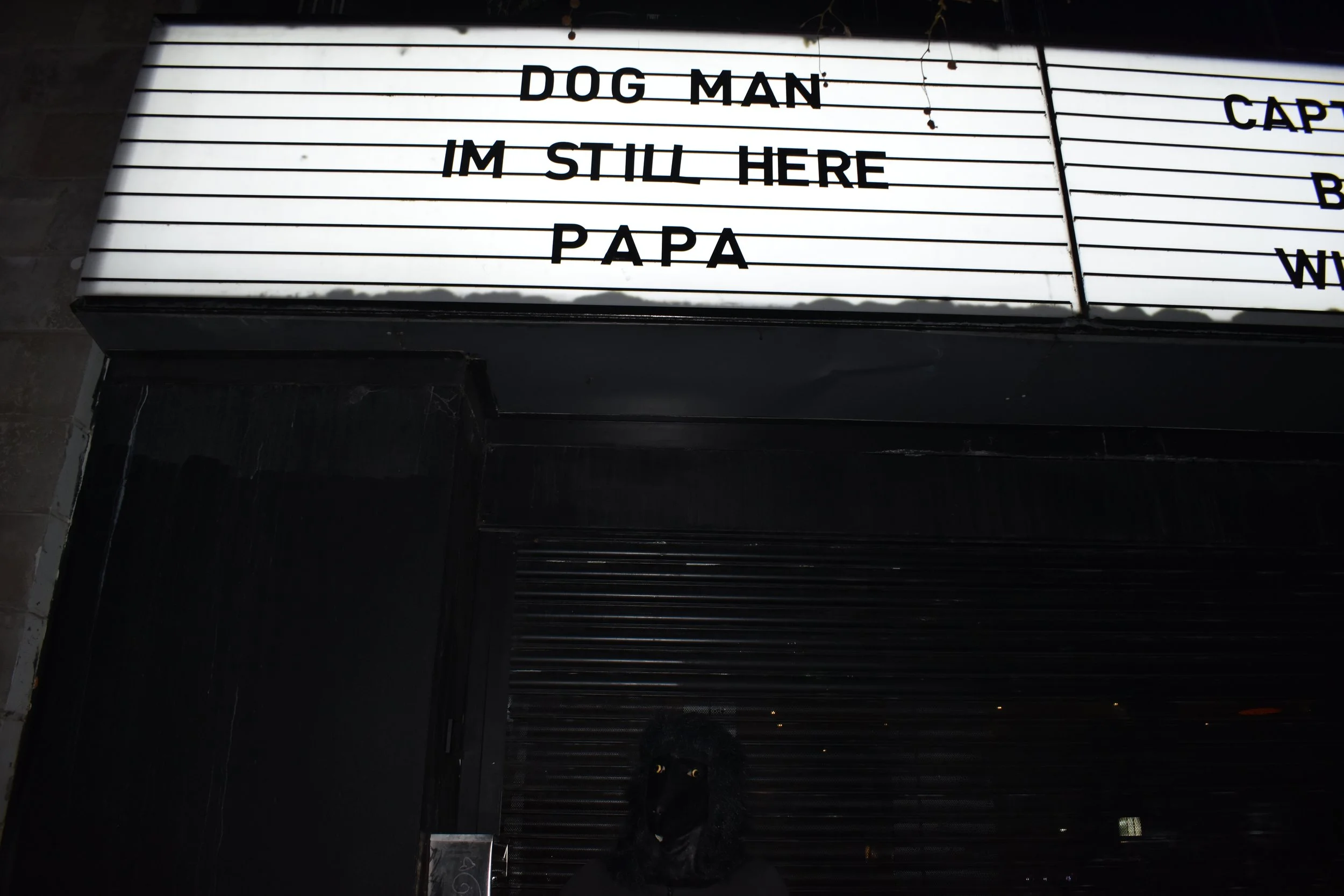
The night I met Ciaran I couldn’t see his face
It’s late on a Thursday in the back of a movie theatre in East London. A crowd is beginning to gather, not to see a movie, but a show. In between the bar and cinema room number 3, sat a stage, a microphone and a dog.
Couches of cheap blue velvet are pulled alongside bar stools and old deck chairs. It’s a full house. The only seating options left are wooden deck chairs. I choose one close to the back. The room is small and only half a step separates the wooden stage from the carpet of curious viewers below. A slat in my chair has come loose and it digs into my lower back. Though what I see unfold on stage, soon makes me forget.
Mr. Dog Face, he declares himself into the microphone. A half man, half dog. Or rather a man dressed in all black, with a plastic dog mask covering his face. His voice is loud but stifled by his rubbery mask, words escaping through a small, circular mouth hole. The room is dark and all available light shines towards the stage, reducing the patrons in front of me into silver silhouettes. We sit, completely transfixed on the human/ canine curiosity the stage offers us, until his last rhyme is squeezed out of motionless lips.
There is silence for a while. Then slow, uncertain claps puncture the empty air. The dog takes a bow.
I watch as the crowd in front of me slowly turn their heads towards their friends. Without any words needing to be uttered out loud, I could hear what they were saying:
“What The Fuck?!’’
A few weeks later I found myself drawn back to the same small room behind the pub and cinema room number 3. Tonight, the stage is deserted, the cinema almost empty. Only a few beer bottles and empty plastic plates line the tables next to me. It’s the last showing of the night and I sit quietly as explosions and music soundtracks leak between the cracks of closed cinema screen doors.
I’m here to meet Mr. Dog Face. Now, though, as he stands in front of me unmasked, he tells me his name is Ciaran. Dark features and jet black hair compliments his canine alter ego’s black fur. I think to myself that it’s true what they say, dog’s do look like their owners.
I asked him to meet me to understand one question, one that I couldn’t get off my mind since the night I met him:
Why?
What makes a man put on a dog mask, get up on stage in front of a room full of strangers and begin to recite poetry?
Before sitting down, he prepares himself a drink. A mixture of cointreau and other miscellaneous liquids one could only find behind a well stocked commercial bar. ‘A Cowboys Cocktail’ he calls it.
‘I never knew normal,’ his story starts. He explains that his parents came from two different worlds. Socialists and storytellers. His mother’s family came from Japan and, according to their grandmother’s stories, once owned their own mountain but lost it in a deal-gone-wrong. ‘It’s not a big loss,’ he tells me, ‘Japan has a fuck-tonne of mountains.’
His father, a sweater wearing socialist from Bristol, settled their family in one of England’s New Towns, just East of London. New Towns were built around England following the Second World War. Sold to their inhabitants as havens specifically designed for the working man, they provided a solution to overcrowding in their neighbouring major cities.
“Nothing is too good for the normal person, my father always used to say.”
Though the proposed Halcyons never lived up to what they were meant to be. I watch as he fiddles with his cup, moving it slowly from hand to hand.The liquid begins to swirl into a small cointreau flavoured whirlpool. We start talking about his childhood. He was five when death first came knocking at his door. His brother got sick. He remembers seeing his mother’s pain. He remembers the awe of watching raindrops chase each other to the bottom of the window pane. When you’re young, the world is so big, everything is new and exciting, he tells me. The forest behind his house felt like a whole other universe. His world became a weird mixture of wonder and sorrow.
Death came once more to his living room. On his eleventh birthday, his dad had a heart attack and died in his arms. The contours of his life darkened again. Grief seemed to hide around every corner. Soon after, his mother joined a cult and left her family behind. “Jesus sized scars” he tells me, with a strained chuckle.
Death, addiction and cults, he talks of his experiences in childhood, slowly shifting in his chair as he speaks. ‘I was having these crazy experiences, but at the same time I was watching beautiful films, listening to great music and reading philosophy that I found really inspiring. I could go and watch Paris, Texas and see people genuinely relating to each other. I could see a sense of humanity that just doesn't exist in my intimate familial life.” So, he disappeared into the cinema to find a better reality, and a bonafide cinefile was born.
Still the films eventually had to come to an end. Reality remained. Youth spent in a no-hope town, with a broken family. A bitter pill, sweetened only by three close friends. ‘Three fellow dreamers,’ he describes them to me. All emboldened by the naivety of adolescence, all desperate to get out of their shitty town and to rebel against how much world told them they were allowed to have.
“I didn't go to a really nice school. I didn't read the classics when I was younger. But every person is entitled to fine words in their mouths and fine thoughts in their head. So I don't mistake the impression of someone from the richness of someone.
I can be a poet, and I can still be cockney.”
This is partly the reason behind his mask. Breaking the feedback loop of how the audience expects him to look and act. ‘A fun curveball in a world of tepid order,’ he explains. If there’s one thing he wants no part in, it’s the cleanly, boringly constructed nature of normality.
“The stronger, more seemingly fixed sense of order, the harder it is to truly express oneself, to let feelings and thoughts surge, and see where they might go. If we’re too self-conscious, restrained, predictable and programmatic I don’t think we really get the chance to know and experience ourselves.” Performing poetry in a plastic dog mask is a strong tonic to that. As strong as they may come.
He takes a small sip from his nearly empty cup and continues.
We must believe that anything that art can conjure, inspire and arouse in its audience, is innately a good thing. Art can evoke things in us that the rigid world cannot and it’s only by bringing these internal undercurrents to the surface, that we can begin to explore them and to process them. If we constantly run from the thoughts and feelings we keep deep inside of us, they will only become bigger, wilder and more frightening.
‘If art makes you feel as though the air is getting knocked out of you, you’re on the right track,’ he tells me with a grin.
The cinema rooms behind us have gone quiet. For the first time tonight, I realise the speakers above have been playing faint radio pop music all night.The last people of the night shuffle through their double decker doors. Both of our cups are now empty. Before I go, I have one final question for Ciaran:
‘Why a dog?’
‘First of all, I fucking love dogs. Secondly, some of the most challenging experiences I've had existentially have been with dogs.’
He takes me back to the Vets office he remembers himself in as a kid. A world of white brick walls and easy to clean silver. His pet dog, Coover, had just broken his back and laid before him limp on a metal table. The Vets in their long coats and serious faces gave the dog 48 hours and a 50% chance of survival.
"We had to leave him behind” he tells me, and I watch as his body pulls away from the words. He looks down at his hands as he speaks, and I imagine Coover, shaved and scared, waiting to see if his family will come back. I imagine life in a fluorescent room as time goes away and day and night fold into one.
“Luckily he pulled through,” Ciaran continues. His eyes find mine again and I notice the circles of white thicken around their brown centres. “It was that moment, when he saw us coming back for him, that he let out a yelp that all at once said ‘how could you leave me?’ ‘Thank God you’re back,’ ‘I'm scared,’‘I love you,’ ‘take me home’ and ‘please never leave me again.’
His eyes look to the ceiling and he finds another memory there. Another seemingly insignificant moment once lost to the brain’s tendency to degrade the past. He recalls himself on a run.
The ground is tacky and wet from a bout of spring time rain, and he works harder to push his body forward at speed. Around him, the forest is silent, except for the cooing of distant birds and the rhythms of exasperated breaths. His two dogs trailed behind him. Without having to look, he knew which breath belonged to who. The quicker, more desperate inhales of air belonged to Coover. Older, and injured, Coover's body was no match for the long, steady strides of his younger sister.
Nearing the end of the track, Ciaran slows and the two dogs move past him. This is their ritual, the thrill of the last sprint; each chasing tails or victory. Ciaran traces circles in the bark and dried leaves with his feet, waiting. He knows what the outcome will be. The same as it always is. A more able body, one unencumbered by injury, will always be the winner. The finish line will always be closer, always easier to reach. Every law in the universe dictates this result.
Though when he looks up, he sees that it’s the older dog, with it’s broken back, that crosses the finish line first. “He looks up at me and barks to say ‘I did it! It's me.’” Ciarans eye’s stare ahead, unblinking. He continues to describe the look of confusion and pride on an old dog's face, a defiance against age and ability. He turns to look at me directly, and asks a question that I can tell he doesn't know the answer to:
“How does this not-pretty-smart animal suddenly become chuffed and confused by himself?”
He describes these moments of seeing something greater in seemingly hunger-driven animals, of seeing moments of humanity come from unhuman places. A dog’s yelp can convey, all at once, a jumble of emotions so distinctly human that one has to wonder where it all comes from. An old dog with a broken back can show a level of determination and tenacity of spirit that trumps the limits of how far his body tells him he can go.
A beautiful mind fuck, he describes it to me. Which is exactly what he brings about when he dons his rubber mask and becomes Mr. Dog Face.
Before he stands to leave, he has one more thing to tell me. “I'd like to say, and I have very strongly felt this, that because I've not been given a normal life to live. I'll hopefully choose a life more extraordinary. I'll say weird shit. I'll put on a dog mask. I'll get punched in the face cosmically to be able to express something new, that could be useful and meaningful to a wider audience. I’ll sacrifice some things, to create something for everyone.”
I watch as he disappears down rounded stairs. I gather up my notebook and stop the tape that had been recording us as we spoke. The lights turn off, and the room is black. In front of me, I see two small headlights, cutting circles of white against black, offering two small windows into the world ahead.
As I push open the glass doors to leave, I know now what the world looks like through the cut out eyes of a plastic dog mask.


